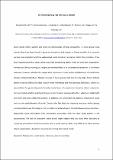Do female Norway rats form social bonds?
Abstract
Social bonds reflect specific and enduring relationships among conspecifics. In some group-living animals, they have been found to generate immediate and long-term fitness benefits. It is currently unclear how important and how widespread social bonds are in animals other than primates. It has been hypothesized that social bonds may help in establishing stable levels of reciprocal cooperation. Norway rats (Rattus norvegicus) reciprocate received help to an unrelated social partner. It is hitherto unknown, however, whether this cooperative behaviour is based on the establishment of social bonds among involved individuals. Norway rats live in social groups that can be very large; hence, without bonds, it may be difficult to keep track of other individuals and their previous behaviour, which is a precondition for generating evolutionarily stable levels of cooperation based on direct reciprocity. Here we tested whether wild-type female rats form bonds among each other, which are stable both over time and across different contexts. In addition, we scrutinized the potential influence of social rank on the establishment of bonds. Despite the fact that the hierarchy structure within groups remained stable over the study period, no stable social bonds were formed between group members. Apparently, social information from consecutive encounters with the same social partner is not accumulated. The lack of long-term social bonds might explain why rats base their decisions to cooperate primarily on the last encounter with a social partner, which may differ from other animals where cooperation is based on the existence of long-term social bonds.
Citation
Schweinfurth , M K , Neuenschwander , J , Engqvist , L , Schneeberger , K , Rentsch , A K , Gygax , M & Taborsky , M 2017 , ' Do female Norway rats form social bonds? ' , Behavioral Ecology and Sociobiology , vol. 71 , 98 . https://doi.org/10.1007/s00265-017-2324-2
Publication
Behavioral Ecology and Sociobiology
Status
Peer reviewed
ISSN
0340-5443Type
Journal article
Description
This study was funded by the SNF-grant 31003A_156152 provided to MT.Collections
Items in the St Andrews Research Repository are protected by copyright, with all rights reserved, unless otherwise indicated.

